02:05
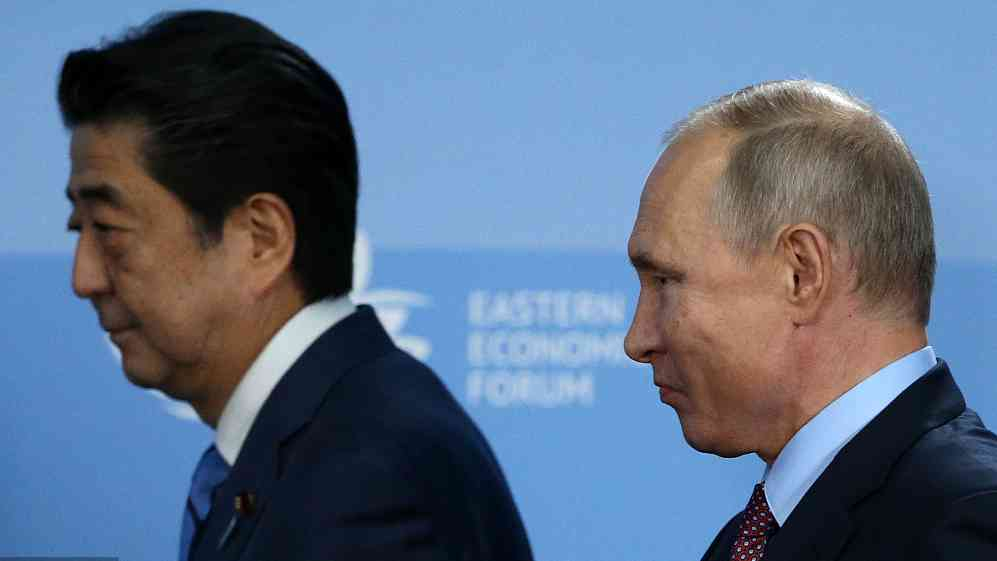
Japanese Prime Minister Shinzo Abe is taking to the road on Monday to hold his 25th meeting with Russian President Vladimir Putin in Moscow. The visit takes place after a year of fast-paced dynamics that has placed Japan in a cradle of unpredictability – the United States adopting an unusual approach to this clingy Asian ally, a Korean Peninsula swinging back and forth between its old quasi-war scenario and a new age of peace, and a trimmed GDP forecast for East Asia while globalization is under siege.
Last September, Abe's cruise to victory in the ruling Liberal Democratic Party (LDP) leadership contest sent him on course to become the longest-serving prime minister of postwar Japan. To leave a legacy during the waning days of his tenure, the 64-year-old politician is zeroing in on resolving the decades-long territorial dispute with Russia, besides constitutional revision, in his third term.
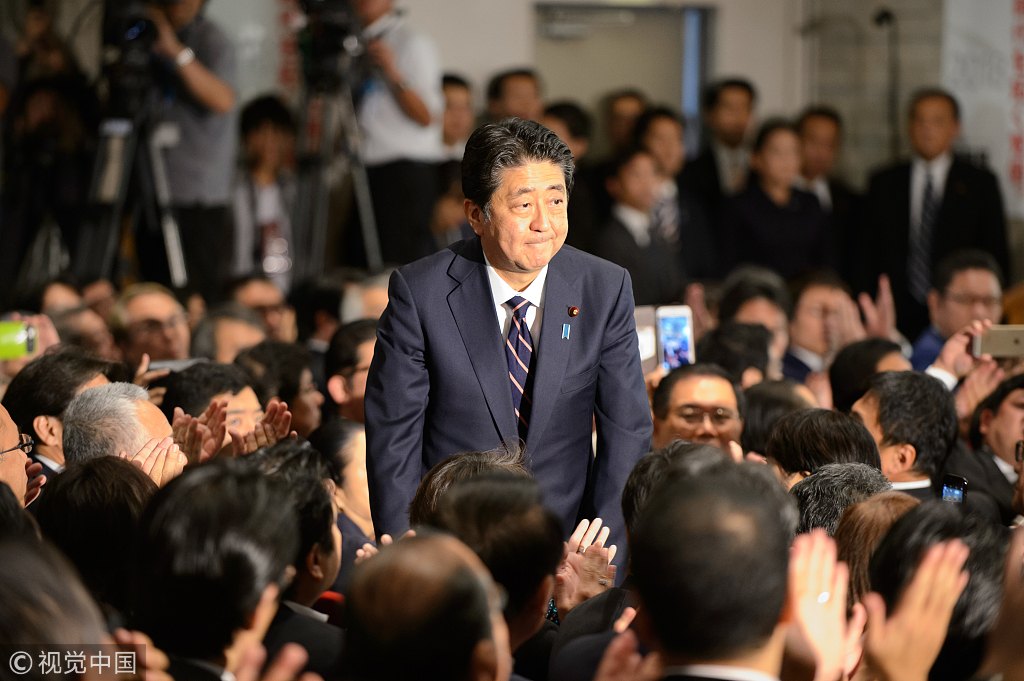
Japanese Prime Minister Shinzo Abe takes a bow after being announced the winner of the Liberal Democratic Party's (LDP) presidential election at its headquarters in Tokyo, September 20, 2018. / VCG Photo
Japanese Prime Minister Shinzo Abe takes a bow after being announced the winner of the Liberal Democratic Party's (LDP) presidential election at its headquarters in Tokyo, September 20, 2018. / VCG Photo
Interminable islands row
The territorial spat over four Pacific islands – known as the Southern Kurils in Russia and the Northern Territories in Japan – dates back to World War II, when the former Soviet Union tried to reclaim lands it had ceded to Japan in previous engagements from half a century before. Even after Japan formally surrendered, the Soviet Union advanced, occupying ceded territory and additional islands that it had never claimed.
This state of war continued into the 1950s until negotiators from both sides agreed on how the island territories should be divided. Those on the Japanese side agreed to forfeit all of the Kuril chain islands and the south part of Sakhalin, while the Soviet diplomats decided to return Shikotan and Habomai.
The peace treaty was close to fruition until the U.S. intervened, fearing that Japan's improving relations with the Soviets and potentially China would jeopardize its influence in the region. So the U.S. threatened to annex comparable territory in Japan that it was occupying, such as Okinawa, if the latter were to allow the Soviet Union to keep those islands specified in the treaty.
An emboldened Japan then redefined the Etorofu and Kunashiri islands, which were part of the Kuril chain and which it had agreed to let the Soviet Union keep, as part of the Northern Territories, effectively claiming that these were distinct lands that will remain under the sovereignty of Japan.
The new terms tanked the peace treaty. Instead, Japan and the Soviet Union signed a joint declaration in 1956 that effectively ended the war and restored diplomatic ties. The Soviet Union put the territorial dispute on the backburner by stipulating in the declaration that the islands of Shikotan and Habomai will be returned to Japan upon signing a peace treaty. Over six decades later, a treaty remains elusive.
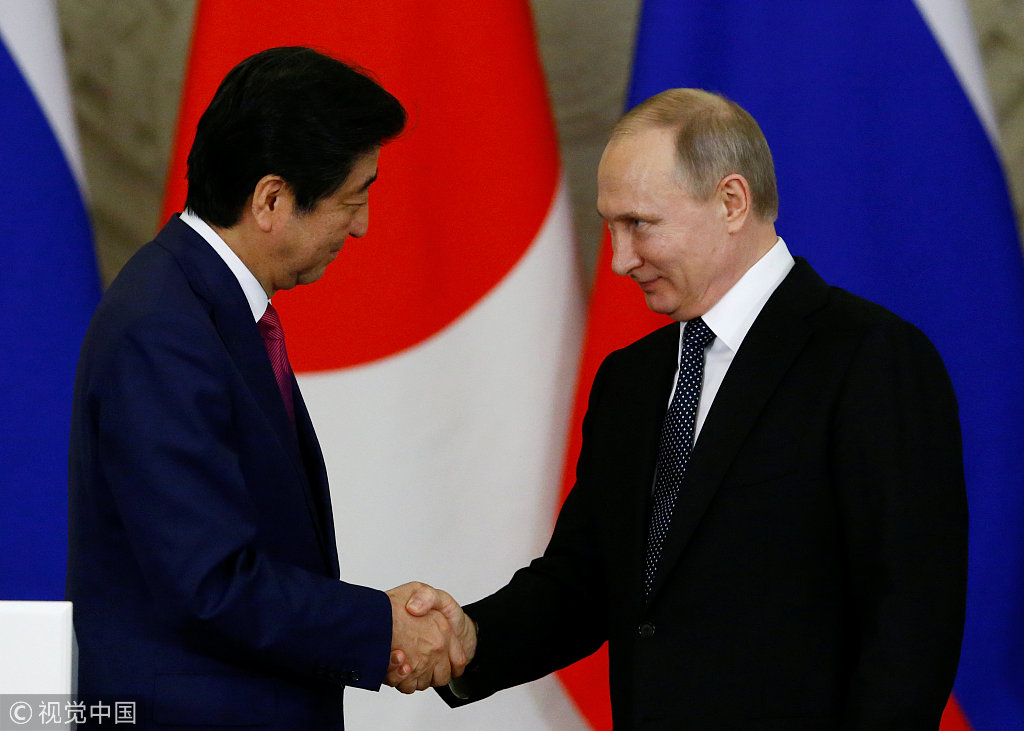
Russian President Vladimir Putin (R) shakes hands with Japanese Prime Minister Shinzo Abe during a media briefing following their meeting at the Kremlin in Moscow, Russia, April 27, 2017. /VCG Photo
Russian President Vladimir Putin (R) shakes hands with Japanese Prime Minister Shinzo Abe during a media briefing following their meeting at the Kremlin in Moscow, Russia, April 27, 2017. /VCG Photo
Peace treaty stuck in a rut
All Japanese prime ministers have tried to reclaim the Northern Territories, but none have succeeded. That's why Abe considers the task a priority, cozying up to Putin with zeal, though public support in both countries doesn't seem to justify such enthusiasm – popular surveys in both countries show that few care or even know about this issue.
"The prospect of possibly making history is potentially important for Abe, but I think it's quite difficult," said Kent Calder, director of Japan Studies and Asia Programs at Johns Hopkins School of Advanced International Studies, during an interview with CGTN. He cited recent tensions between Ukraine and Russia as well as an ambivalent attitude in the West as major obstacles.
Abe's previous 24 rounds of talks with Putin since 2012 have all failed to go beyond their conventional positions. Now, it seems that things are getting tougher. Russian Foreign Minister Sergei Lavrov said recently that no concrete result came out of his meeting with his Japanese counterpart Taro Kono, casting a shadow over Abe's Russia trip. Lavrov warned that the negotiations must be on the premise of Tokyo's full recognition of the WWII aftermath, according to an AFP report.
Furthermore, tensions are running high between Washington and Moscow over Syria and Ukraine. In the latest move, the U.S. announced it would suspend observing the Intermediate-Range Nuclear Forces Treaty on February 2, eliciting accusations of intransigence from Lavrov and leading to the strained likelihood of an arms race. As the Treaty of Mutual Cooperation and Security between the U.S. and Japan signed in 1951 allows a U.S. military presence in Japan, ceding the Pacific islands to this U.S. ally will pose a security threat to Russia.
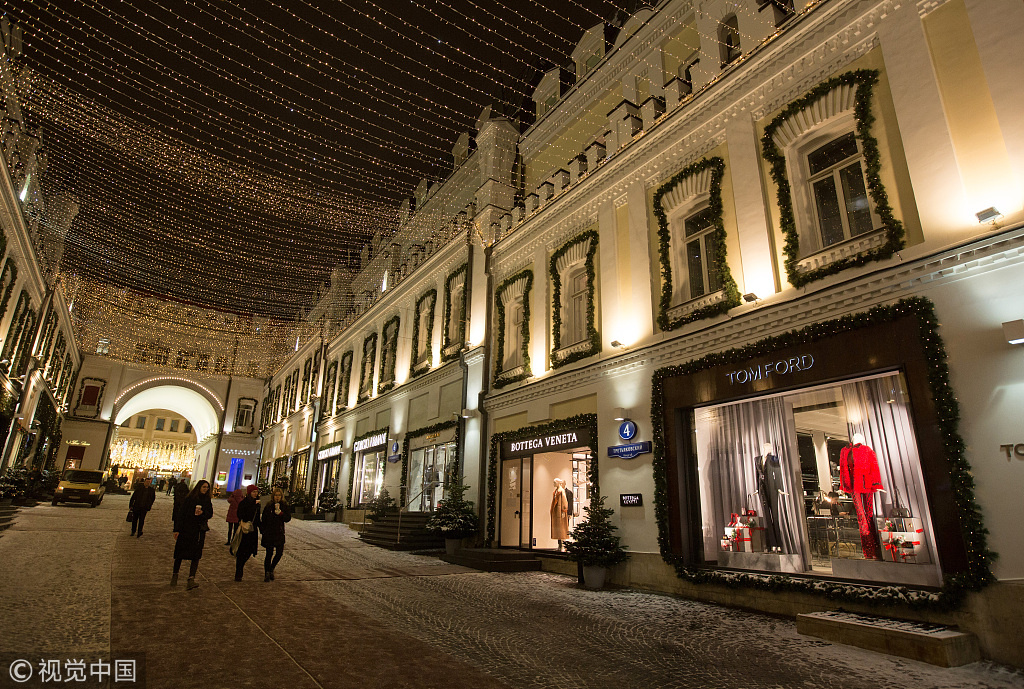
Lights illuminate luxury boutique stores including Tom Ford and Bottega Veneta Srl, on Tretyakov Drive in Moscow, Russia, December 27, 2018. /VCG Photo
Lights illuminate luxury boutique stores including Tom Ford and Bottega Veneta Srl, on Tretyakov Drive in Moscow, Russia, December 27, 2018. /VCG Photo
Both economies need a boom
While a peace treaty on the territorial row likely won't materialize, Abe is unlikely to come home empty-handed. "For Abe, the idea of making history by doing something diplomatic that other leaders have not done is one factor, but of course, there is economic attractiveness," said Calder, also director of Edwin O. Reischauer Center for East Asian Studies at Johns Hopkins.
For years, Japan has been blighted by economic malaise, intertwined with population decline, flatlined GDP figures and most recently a harsh U.S. line on trade. Abenomics – a controversial economic policy package based on the "three arrows" of monetary easing, fiscal stimulus and structural reforms, will hardly buoy the Japanese economy in the coming years – not only because Abenomics has resulted in the world's biggest debt burden, but a consumption tax hike from 8 to 10 percent will come into effect this October.
Japan needs energy, which Russia abounds with. Meanwhile for Russia, a country under Western sanctions since 2014, it's a matter of "economic cooperation, infrastructure, and Japanese investment," noted Calder, who served as special adviser to the U.S. ambassador to Japan in the 1990s. "An agreement with Japan could make Russia's economy much livelier."
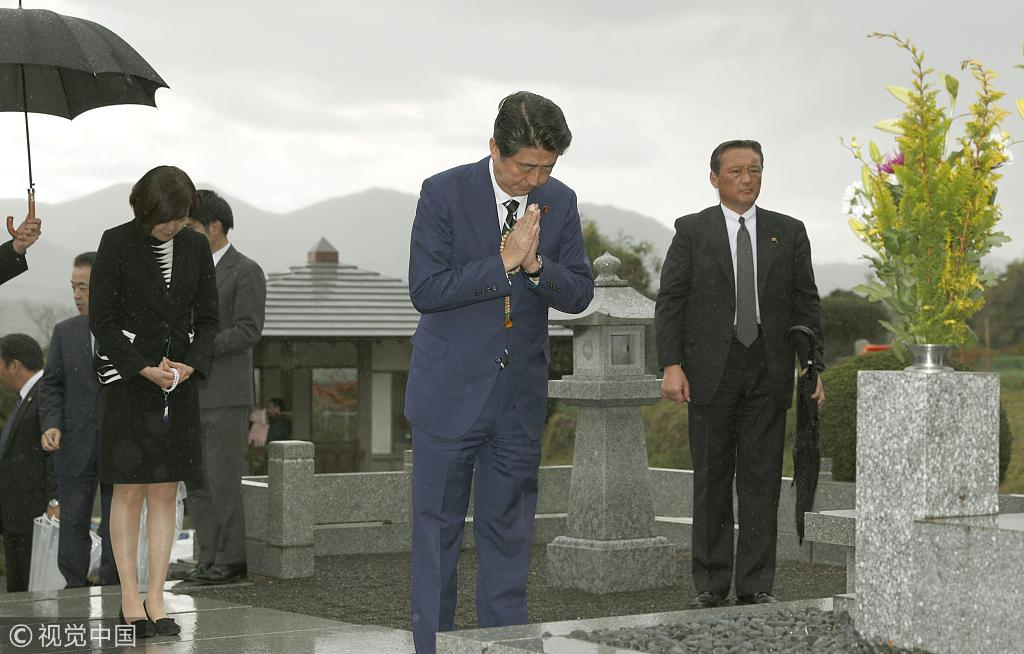
Japanese Prime Minister Shinzo Abe (C) visits the grave of his father, former Foreign Minister Shintaro Abe, in Nagato, Yamaguchi Prefecture, January 6, 2019, alongside his wife Akie (L). /VCG Photo
Japanese Prime Minister Shinzo Abe (C) visits the grave of his father, former Foreign Minister Shintaro Abe, in Nagato, Yamaguchi Prefecture, January 6, 2019, alongside his wife Akie (L). /VCG Photo
Diplomatic attractiveness
Apart from ensuring a stable economy, which sustained his popularity in the reelection, Abe eyes greater Japanese diplomatic flexibility and influence in northeast Asia. Entering his seventh year, he has to keep the plate full to become Japan's longest-serving prime minister by September 2021 when he leaves office.
In 2018, one of the most dramatic geopolitical changes took place on the Korean Peninsula. Kim Jong Un made a whirlwind of overtures to Seoul, Beijing and even Washington, but neighboring Tokyo and Moscow were excluded in the peninsular rapprochement.
"The Korean situation will make the discussion between Japan and Russian more attractive, as both countries have the desire to be more active on the Korean Peninsula issue," Calder told CGTN.
There's another factor in Abe's frequent meetings with Putin – to fulfill the dream of his late father. Shintaro Abe, former foreign minister of Japan, witnessed his country work to normalize ties with the Soviet Union under the Mikhail Gorbachev government.
"Abe's father and grandfather and Japanese negotiators across history longed to see the Japanese leverage increase through a resolution with Russia," Calder said.
Resolving the Russia problem almost seems to be Abe's destiny, but as with the success or failure of all things, the devil is in the details.






